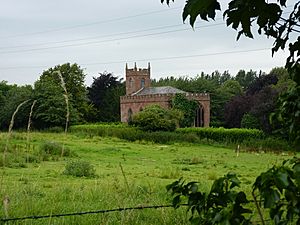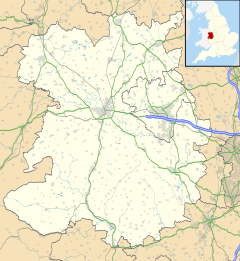Longford, Telford and Wrekin facts for kids
Quick facts for kids Longford |
|
|---|---|
 Former church, Longford |
|
| OS grid reference | SJ726182 |
| Civil parish |
|
| Unitary authority | |
| Ceremonial county | |
| Region | |
| Country | England |
| Sovereign state | United Kingdom |
| Post town | NEWPORT |
| Postcode district | TF10 |
| Dialling code | 01952 |
| Police | West Mercia |
| Fire | Shropshire |
| Ambulance | West Midlands |
| EU Parliament | West Midlands |
| UK Parliament |
|
Longford is a small village in Shropshire, England. It is located near the town of Newport. Longford used to be its own local area, called a civil parish. But now, it is part of the Church Aston parish.
Longford has a long history. People have found old Roman coins and items from the Middle Ages here. The village was even mentioned in the Domesday Book in 1086. This was a big survey ordered by King William the Conqueror. Back then, Longford had 23 households and a mill.
Contents
Discovering Longford's Past
Longford has many interesting historical places. These include Longford Hall and a very old dovecote from the late 1500s. A dovecote is a building where pigeons or doves were kept. There is also the Church of St Mary and the 13th-century Talbot Chapel. You can also see the remains of an old mill race. This was a channel that carried water to power a mill. Several old farm buildings also show the village's history.
Longford and the English Civil War
Longford played a part in the English Civil War. This was a big conflict in England between 1642 and 1651. It was fought between the Parliamentarians (also called "Roundheads") and the Royalists (also known as "Cavaliers").
The First Battle of Longford
On March 25, 1644, a battle happened right here in Longford. Colonel Thomas Mytton led 500 Parliamentarian soldiers. They were heading to Royalist strongholds nearby. Mytton stopped in Longford to let his men rest. Longford was already guarded by Parliamentarian troops.
However, Royalist leaders Sir William Vaughan and Colonel Robert Ellice found Mytton. They led local Royalist forces and defeated Mytton's troops. After driving Mytton away, the Royalists then surrounded the small Parliamentarian group. These soldiers had taken shelter inside Longford Hall. The Hall was defended for a week. But on April 2, 1644, the Parliamentarians surrendered to the Royalists.
Oliver Cromwell at Longford
Later, in late 1645, a very famous leader arrived at Longford. This was Oliver Cromwell, a key figure for the Parliamentarians. His forces quickly took control of the village. Cromwell then immediately surrounded Longford Hall.
Cromwell asked the Royalist soldiers inside to give up. Sir Bartholomew Pell, the Royalist commander, talked with Cromwell. He managed to get good terms for his men. Pell surrendered to Colonel Hawson and Major Kelsy. The agreement said that the Royalist soldiers had to give up their weapons. But Pell and his 14 officers could keep their horses, swords, and pistols. The soldiers were then escorted towards Oxford. Once these terms were met, Pell and his officers left Longford Hall.
The Story of Longford Hall
The first Longford Hall was built in 1275. It was built by Adam de Brompton. The Hall was later owned by the Earl of Shrewsbury. After being captured by Royalists in April 1644, this original Hall was torn down.
The building you see today was built later. It was constructed between 1794 and 1797. Colonel Ralph Leeke had it built. The design was created by Joseph Bonomi. Today, Longford Hall is used by Adams' Grammar School. It serves as a junior boarding house and has sports fields.
Longford's Landscape
Longford is located on the Brockton Fault. This means there are interesting rock formations in the area. You can find sandstone, called Kidderminster Conglomerate, and slate here. These materials were once mined in nearby places like Brockton, Stockton, and Church Aston.


